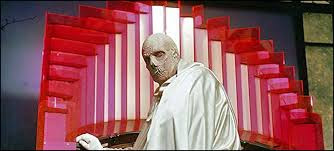(Originally published on LivingCorpse.com on May 5, 2005) - It’s extremely difficult for someone to label himself (or herself) a horror fan without having any knowledge of the genre’s cinematic history. Yet, with the horror explosion Hollywood has been experiencing for the last decade, there are droves of new moviegoers gravitating to the genre like never before. And, while it’s great to know this highly underrated (and often misunderstood) genre is finally getting the kind of love it deserves, I fear that this new crop of fans are only looking toward the next big studio release, rather than spending the in-between time familiarizing themselves with horror classics.
One such horror classic I think more fans should seek out is, The Abominable Dr. Phibes. Released in 1971, Vincent Price stars as Dr. Phibes, an extremely wealthy doctor who, after a car wreck that presumably killed him, and put his wife in dire straits, returns from the dead to exact revenge on the nine doctors that failed to save his wife’s life. Drawing inspiration from ancient Egyptian plagues, Phibes proceeds to unleash his special brand of revenge on the doctors, located in and around London.
To say the death scenes are “unique” is an understatement; and never mind the fact that most of them would realistically be impossible to pull off anyway, given just how complex, yet still heavily reliant on dumb-luck they are. From the film’s opening credits—which displays a very stylish musical number including classic organ playing, a wind-up orchestra built to life-size scale, and a waltz—we’re allowed in on the fact that this is a complete work of fantasy. Everything about Dr. Phibes is so stylish it’ll leave you giddy, and thoroughly entertained by his panache.
When doctors start turning up dead via strange ways like having their blood completely drained, being eaten alive by bats, or having their skull crushed by a frog mask, Scotland Yard assigns Inspector Trout (Peter Jeffrey) to the case, along with his partner, Crow (Derek Godfrey). The introduction of Trout is coincided with the introduction of a running comedic element that, when blended with the flamboyance of Phibes, creates one of the better executed cinematic cocktails of camp ever created. Proof of this is the manner in which Trout responds to the grisly deaths, his superior who demands immediate answers, and people who continually refer to him as another species of fish. Because the darker half of this film is so over-the-top, this lighter side only accentuates the overall vibe; not detract from it.
As the film reaches its crescendo, the last remaining doctor left alive, Dr. Vesalius (Joseph Cotton) discovers that his fate isn’t to die, but to lose someone close to him, keeping in line with the laundry list of curses Phibes draws his inspiration. From here, the film takes its final, and most chilling, turn where Vesalius must hurry to save his son from a horrible fate. It is at this point that we, for the first time, begin to recognize Dr. Phibes as pure evil, rather than the sympathetic griever we’d grown to know.
The classic score gives the camp a haunting suspense, which helps to maintain the fact that this is, at its core, a horror film. The scenes where Phibes speaks to his wife by conversing with a large oil portrait of her are very creepy. Due to the loss of his voice in the car accident, Phibes speaks through an external voice box that connects to the side of his neck via a cord. The cryptic manner in which Phibes professes his undying love to his wife, and his vengeance towards the doctors, conjures feelings of both compassion and terror.
Virginia North’s role as Phibes’ beautiful, and mute, assistant Vulnavia is equally creepy, as no explanation is ever given for her existence. She does, however, provide the film with the requisite “babe factor” needed for all horror films.
The Abominable Dr. Phibes is a blissful jaunt through one of horror’s most campy and imaginative films. Price excels at providing the creep factor, and Jeffrey is just down right funny. If you’ve never seen this film, I’d recommend you do so, be you old genre fan or new.




No comments:
Post a Comment